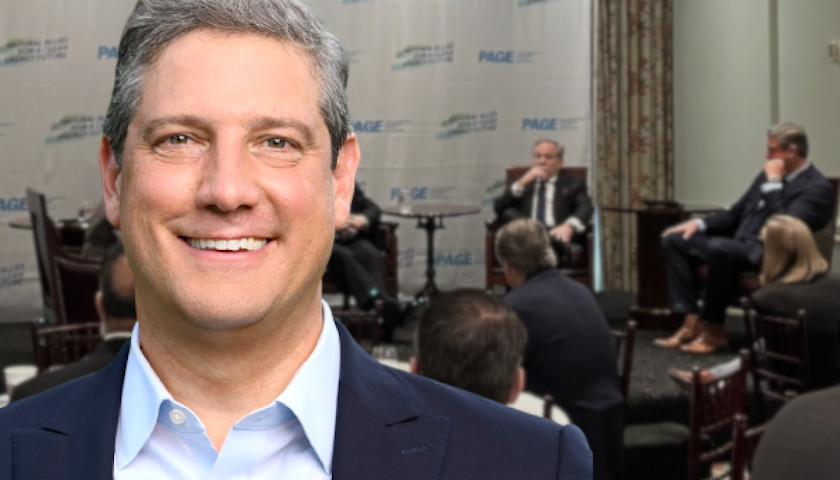Supporters of exporting liquid natural gas (LNG) from Philadelphia got unambivalent backing from Democratic former Ohio Congressman Tim Ryan at a state hearing at the city’s Navy Yard on Thursday.
The liberal ex-lawmaker who unsuccessfully opposed Republican J.D. Vance for the U.S. Senate from Ohio last year is now on the pro-natural-gas Natural Allies for a Clean Energy Future leadership team. In that capacity, he appeared before the LNG Export Task Force to strongly urge the creation of an LNG terminal at the Port of Philadelphia.
“Pennsylvania’s opportunity to develop an LNG export facility is huge,” he told the panel comprising state lawmakers, industry members, and labor leaders. Such a move, he said, would mean the creation of “thousands of jobs.”
Many of Ryan’s fellow Democrats oppose the export hub on environmental grounds. He assured wary progressives that natural gas is a much cleaner energy source than other fossil fuels. Federal data bear this out: In 2021, the U.S. Energy Information Administration attributed a 32-percent decline in carbon-dioxide discharge from the electric-power sector over a 15-year period to an increase in natural-gas usage over coal.
“It is possible to be both pro-climate and pro-natural-gas,” the former Youngstown-area lawmaker said. “And liquefied natural gas in the terminals that move them overseas provide a truly unique opportunity to make progress fast on climate. And in the absence of natural gas, the world burns dirtier forms of energy, primarily coal, and this is something that a lot of people in this space do not talk about.”
Ryan said that achieving environmentalists’ global-warming-reduction goals will become “nearly impossible” without infrastructural development and permitting reform to ease natural gas’ broader purveyance. He said this can take place even as the commonwealth welcomes the heightened use of renewable power sources like wind and solar. He explained that while those options avoid the problem of carbon emissions, they don’t work with the constancy that natural gas does.
“Natural Allies is for renewables,” he said. “We think it’s a great marriage between natural gas and renewables…. We’re moving in that direction but you’ve got to have stable supplies.”
The ex-congressman added that copious LNG shipping from terminals elsewhere in the U.S. helped Europe meet about half its energy needs last year as the continent diplomatically conflicted with oil-exporting Russia.
“Thankfully, America answered the call to stabilize allies, confront tyrants like [Russian President Vladimir] Putin who aim to use energy as a weapon [for] political goals and avoid higher global emissions,” Ryan said. “And it couldn’t have been done without existing natural gas infrastructure and terminals….”
Some of the largest LNG shipping hubs are in place at Cove Point in Lusby, Maryland, and at Corpus Christi Liquefaction’s terminal in Texas. According to Maritime Exchange for the Delaware River and Bay President Lisa B. Himber, these locations’ experiences bode well for a Philadelphia LNG export project if public officials choose to see it through. She ascribed 70,000 jobs and $145 billion in annual economic activity to the LNG exports from Texas and $130 billion yearly to Cove Point exports.
“With global demand for LNG increasing every year, an LNG terminal here can only strengthen the port’s competitive position,” she testified, adding that the regional port bolsters over 156,000 jobs and generates commerce amounting to nearly $50 billion annually. “With it’s strong history as an energy port, Philadelphia is ideally situated to capture a share of this growing market.”
One task force member, State Representative Joe Hohenstein (D-Philadelphia), voiced his hostility to a natural-gas shipping facility in his city, where he represents several neighborhoods along the Delaware River. Testifier Adam Nagel, campaign manager at the environmentalist group PennFuture, echoed Hohenstein’s opposition, insisting that LNG presents “a variety of threats… to our communities.”
“Critically, all of [the liquifying process’s] cooling and pressurizing… makes LNG an extremely volatile and explosive fuel, especially dangerous during transport,” he said.
Despite the hearing’s inclusion of dissenting voices, Hohenstein held a press conference a half-hour before the event to accuse the task force of… excluding dissenting voices. His pre-event featured a profanity-laced denunciation of a prospective export hub by Chester Residents Concerned for Quality Living (CRCQL) Chair Zulene Mayfield. While Mayfield conceded that her city west of Philadelphia is “economically depressed,” she nonetheless dismissed the notion that an LNG facility would yield economic improvement.
“We say hell no!” she said. “It’s not an issue that we are anti-capitalist; we are pro-survivalist.” She said she believes “polluting industr[ies]” such as the Covanta trash incinerator have made her community less healthy.
Minutes later, at the hearing, Hohenstein accused task force chair and State Representative Martina White (R-Philadelphia) of rejecting CRCQL’s request to testify.
“Open debate doesn’t require agreement but it does require trust and, despite my reservations, I did place my trust in the chair that we would have an open debate…,” he said. “I made recommendations for witnesses; all of those recommendations were declined. So trust has been lost. It will take much to regain it.”
White disputed her fellow Philadelphian’s account of the run-up to the hearing, saying that all individuals or groups from whom she received participation requests were allowed to submit testimony and only one organization turned in comments so far. She noted there will be more hearings that will allow more disagreement to be aired. Later that morning, her colleague from across the aisle, State Senator Anthony Williams (D-Philadelphia), seconded her statement that no one’s voice was shut out, as Hohenstein and Nagel alleged.
“You used the word ‘denied,’” he told Nagel. “They’re not denied. We’ll have full expression. I’m here to make sure that happens [in future hearings].”
Ryan responded to Hohenstein and Nagel’s safety and environmental concerns by opining that the experience of shipping LNG from other sites so far shows it does not pose dire risks.
“We’ve been exporting it, it’s on the seas, it’s safe, it’s reliable,” he said. “No major catastrophes have happened. This is just something that we need to continue to do.”
– – –
Bradley Vasoli is managing editor of The Pennsylvania Daily Star. Follow Brad on Twitter at @BVasoli. Email tips to [email protected].
Photo “Tim Ryan” by Tim Ryan. Background Photo “Tim Ryan at Natural Allies for a Clean Energy Future Event” by Natural Allies for a Clean Energy Future.








